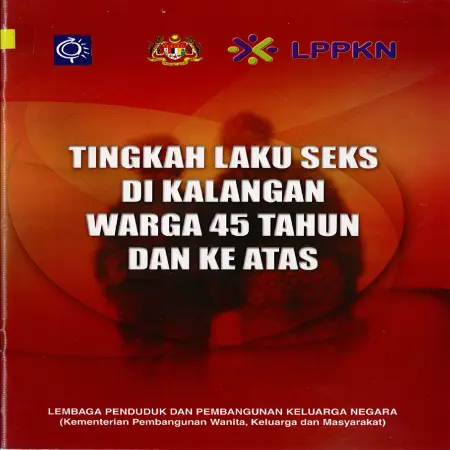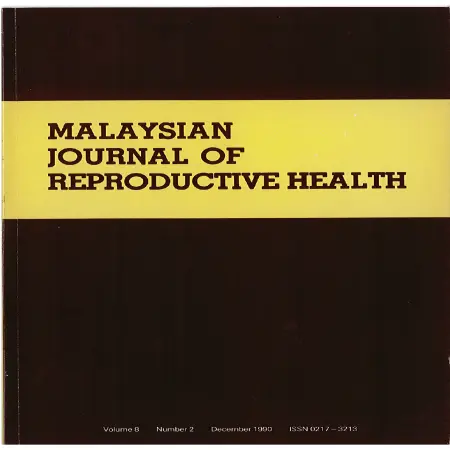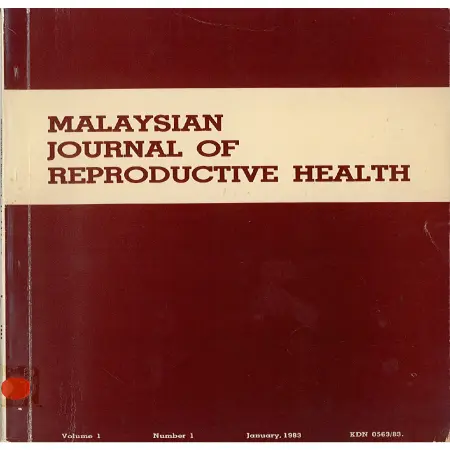Browse by Division/Agency
Results for Division/Agency : "LPPKN - National Population and Family Development Board, Malaysia: Human Reproductive Division"
|
|
Tingkah laku seks di kalangan warga 45 tahun dan ke atas
Item Type: Research Report
Editor:
Year: 00/00/2006
Abstract: An opinion survey on 'Sexual Behavior Among Citizens 45 Years and Above' which was first conducted by the Human Reproduction Division (BRM) was conducted in the Klang Valley area from February to June 2003. The 'Convenience Sampling' sampling method was used where respondents who meet certain criteria fill in the questionnaire themselves. A total of 473 respondents consisting of 50.1% Malays, Indians (26.6%) and Chinese (23.3%) where men (53.5%) outnumber than women (46.5%). The majority of respondents comprised the age group of 50-59 years (41.25%). From the 220 female respondents, only 7.3% took hormone replacement therapy. The results of the study found that the importance and satisfaction of sex decreases with age where it is more pronounced among women than men. The frequency of sexual intercourse is performed in the range of 4-8 times a month (46.3%). Although only 16.7% of respondents had sex-related problems, 70.9% of them did not know the source of help and treatment for their problems. Among those who received treatment, 56.4% chose to seek modern treatment. 55.7% of respondents with sexual problems have at least one chronic disease. A total of 85.6% disagreed and looked for another partner as a way out of sex -related problems. Expectations for better sex in the future are still high at 69.1%. In conclusion, for middle-aged and above despite the declining importance of sexual intercourse, their right to access to knowledge and services related to sexual problems needs to be addressed immediately, especially by medical practitioners, especially the Human Reproduction Division and LPPKN in general. A systematic and ‘gender-sensitive’ approach can help overcome the problem of family institutional breakdown and problems related to incest.
|
|
|
|
|
|
The detection of estrogen-dependent proteins in monkey oviductal fluid
Item Type: Article
Editor:
Year: 00/12/1990
Abstract: To detect hormone induced changes in oviductal fluid protein pattern, flushings obtained from ovariectomized untreated and estradiol or estradiol plus progesterone treated monkeys were analysed by sodium dodecyl sulphate polyacrylamide gel electrophoresis. Superimposed densitometric scans of coomassie blue and periodic acid Schiff's (PAS) stained electrophoretic patterns revealed that estradiol treatment results in the appearance of a new protein (130 K) with maximum carbohydrate content as compared to other proteins present in the luminal milieu. The concentration of 85 and 95 K proteins also increase significantly after estradiol treatment. However, progesterone supplementation in estradiol primed monkeys results in the disappearance of 85 and 95 K proteins and decreased the 130 K glycoprotein considerably. Thus while estrogen acts as an inducer,progesterone antagonizes its action in monkey fallopian tubes and inhibits the synthesis of proteins which may have a role in early reproductive events.
|
|
|
|
|
|
The pattern of maternal mortality at Maternity Hospital Kuala Lumpur
Item Type: Article
Editor:
Year: 00/01/1983
Abstract: From 1978 to 1981, there were 70,000 deliveries at Maternity Hospital, Kuala Lumpur. 39 maternal mortalities were encountered during this four year period. The major causes of death were toxemia, hemorrhage, embolism, medical disease in pregnancy, sepsis, uterine inversion, obstetric trauma, Mendelson and pulmonary edema. Avoidable factors were isolated in all the mortalities except in three, one due to infective hepatitis and two due to cardiac disease in pregnancy. The patient was at fault in four mortalities. The need for documenting all maternal mortalities is a priority in this country to make analysis more meaningful.
|
|
|
|







